|
September 27, 2021 - No. 88
Education Is a Right
Assessing and Dealing with Problems
- Laura Chesnik -
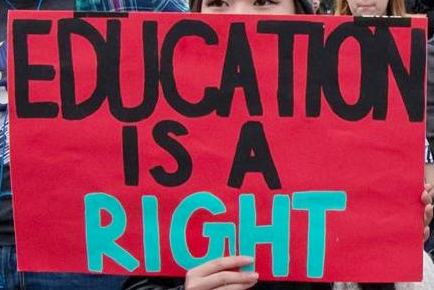 
New Brunswick
• Public Sector Workers Give Strong Strike Vote
Ontario
• Post-Secondary Education Workers Demand Protection for Workers
and Students
• Education Unions Hold Government to Account
Education Is a Right
- Laura Chesnik -
Education Is a Right. This is pretty
much accepted by everyone in today's world but what does it mean? How
is this right defined and how can it be enforced? One thing is for sure
-- defining and enforcing this right are a necessity. Without providing
the coming generations with an education commensurate with
the level required by societies and the world today, how can we
possibly bring into being the kind of future we want?  But
who decides what is needed by societies today? Who decides the content
and funding of education? What forms of social, political and other
culture are the youth imbued with through the education system? What
about settling scores with the old conscience of society such as the
cruel discrimination in the case of Indigenous children and
families and the systemic racism they face? Or the discriminatory ways
in which children from immigrant families and other backgrounds are
treated, or how the Canadian economy exploits international students as
cash cows -- to the tune of $19 billion in the case of "visa students?"
How does the education system assess and deal with the
problems of adolescence and growing up and their many related matters? But
who decides what is needed by societies today? Who decides the content
and funding of education? What forms of social, political and other
culture are the youth imbued with through the education system? What
about settling scores with the old conscience of society such as the
cruel discrimination in the case of Indigenous children and
families and the systemic racism they face? Or the discriminatory ways
in which children from immigrant families and other backgrounds are
treated, or how the Canadian economy exploits international students as
cash cows -- to the tune of $19 billion in the case of "visa students?"
How does the education system assess and deal with the
problems of adolescence and growing up and their many related matters?
Do these issues and how they are dealt with by governments at all
levels support the educators, schools, communities, and most
importantly the youth or are they used to divide us? Do they treat the
youth as human beings with rights or just as categories of "things" to
be targeted for reward or punishment and the consumption of "things"
according to values nobody has discussed and decided for themselves?
An education system is financed to educate and train youth according
to the needs of an economy. When that economy is in the hands of a tiny
financial oligarchy, which is self-serving to the extreme, the
direction of the economy and the education system is set according to
the very narrow private aims of the oligarchs in control. How do we
as educators and others concerned with education and the youth deal
with this reality?
In the field of education, what governments see fit to provide is
controlled by the narrow private aims of those who own and control the
economy, and in particular the companies that produce and sell
everything in the education market. This includes the necessary
infrastructure, buildings, computers, furnishings, textbooks and
equipment of all
kinds. But the tentacles of these private interests reach well beyond
this to what kind of workers they want produced for their labour
market. The control of these powerful private interests extends to the
curriculum, programming, demands for research and importantly the aim
of the education system itself.
The aim of those who direct the education system from the top is to
serve the private interests of those in control of the economy, the
financial oligarchy. The aim coming from the top means that the
educators and youth are put under tremendous pressure to obey and fit
into this anti-social atmosphere of serving narrow private interests
and
their market including their labour market. They are forced to "fend
for themselves" and "do whatever it takes" to secure a niche for
themselves in the education system and labour market the financial
oligarchs control.
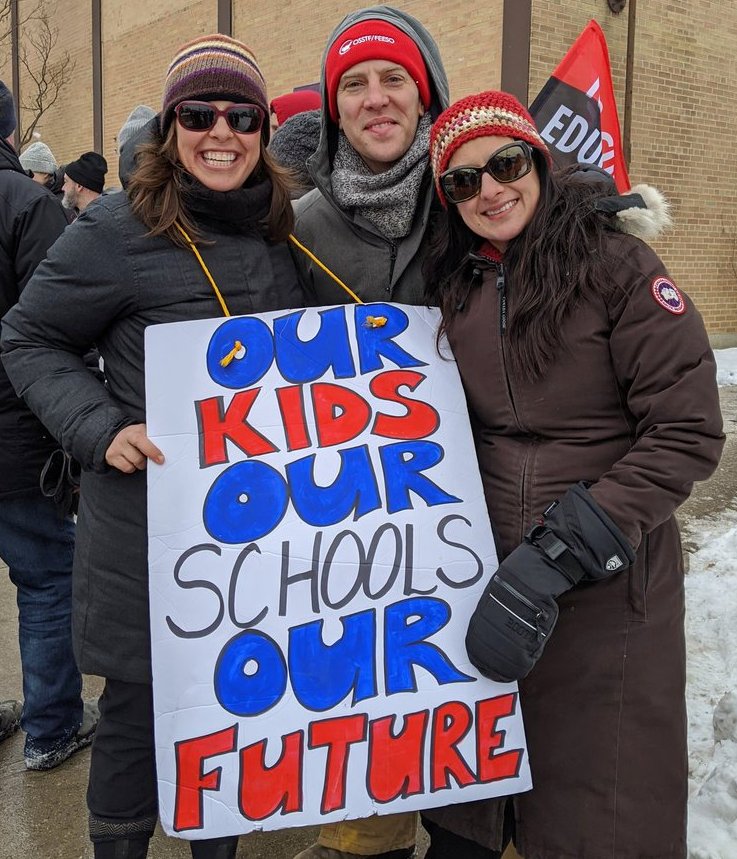 However, try as they might, these narrow private interests do not,
and cannot, control the people. Try as they might, they cannot force
the educators and support workers, parents and students to agree with
them and willingly succumb. This is their problem and society's great
asset. While getting an education is a source of constant worry for
the younger generations because of the cost and the dog-eat-dog,
everyone-fend-for-themselves culture, many youth are defying this
dictate in order to build a bright future for themselves. While the
degeneration of the system of education is increasingly stressful for
teachers, education workers, principals and parents, many are
courageously and
with tremendous dedication and determination finding ways and means to
say No! to the cutbacks, privatization, dictate and imposition of
unacceptable aims and conditions. Even administrators, who are hired
and pressured by those who have their fingers in the education pie to
run schools, colleges and universities like private businesses whose
main aim is to make money for all and sundry, are speaking out despite
threats of job loss and other forms of reprisal. However, try as they might, these narrow private interests do not,
and cannot, control the people. Try as they might, they cannot force
the educators and support workers, parents and students to agree with
them and willingly succumb. This is their problem and society's great
asset. While getting an education is a source of constant worry for
the younger generations because of the cost and the dog-eat-dog,
everyone-fend-for-themselves culture, many youth are defying this
dictate in order to build a bright future for themselves. While the
degeneration of the system of education is increasingly stressful for
teachers, education workers, principals and parents, many are
courageously and
with tremendous dedication and determination finding ways and means to
say No! to the cutbacks, privatization, dictate and imposition of
unacceptable aims and conditions. Even administrators, who are hired
and pressured by those who have their fingers in the education pie to
run schools, colleges and universities like private businesses whose
main aim is to make money for all and sundry, are speaking out despite
threats of job loss and other forms of reprisal.
This resistance, this refusal to give in, this spirit of saying No!
when necessary, makes the unity in action among educators, support
staff, students and parents life-giving and important. It makes the
demands and claims of those who work and live in the field of education
-- educators, students, parents and others -- life-giving and
important.
The educators are professionals who have taken up a duty to society,
to their students and to themselves. When they speak about their
conditions of life and work and the problems in the field of education
as a result of cutbacks and lack of funding or the self-seeking demands
of the powerful private interests, their voices are worth more than
gold. We should listen to them and support them when they fight to
affirm their rights and speak in their own name.
We need a society that provides rights with a guarantee including
the right to education because we need enlightened teachers, education
workers, schools, colleges and universities to help raise our young
people and open a path forward for the progress of society.

New Brunswick
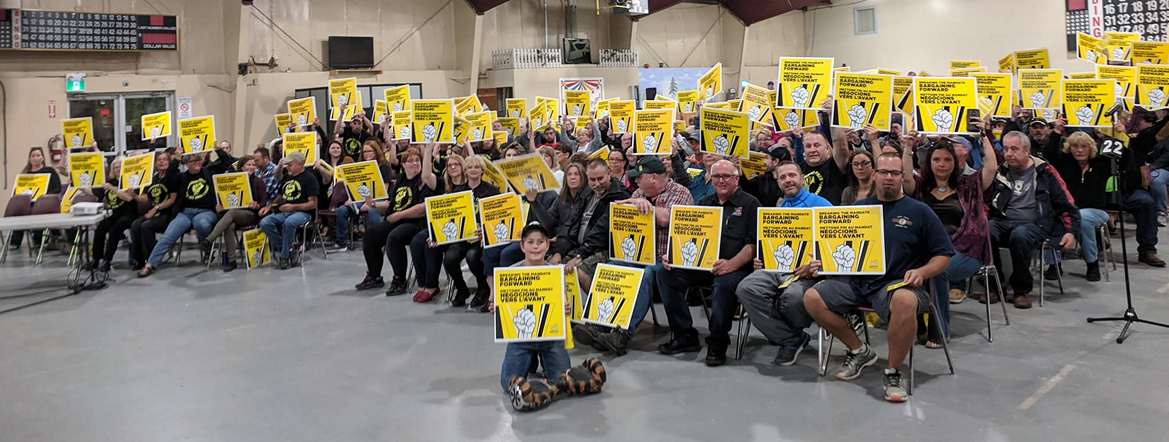
St. John meeting during strike vote on September
22, 2021
In its September 22 bulletin, the Canadian
Union of Public Employees New Brunswick (CUPE NB) reports that seven of
its 10 locals engaged in efforts to renew their collective agreements,
some of which expired as long as four years ago, have been given strong
strike votes. Workers are currently engaged in centralized bargaining
with the government for wages that they consider acceptable and that
will assist in addressing the problem of attracting and retaining
workers in public services. The issue of working conditions must be
resolved through negotiations with the locals. CUPE
NB reports that votes in favour of strike action hover around the 90
per cent range, with high voter turnout. For example, court
stenographers voted 96 per cent in favour of a strike, with a 96 per
cent voter turnout; community college workers voted 93 per cent in
favour of a strike with a 100 per cent member turnout, while WorkSafe
NB employees voted 83 per cent for a strike and had a voter turnout of
88 per cent.
As of September 22, approximately 9,400 of its 22,000 membership had held their strike votes.
Local 1252, the largest local representing close to 11,000 health
care workers, held its strike vote from September 23-25, with the votes
to be counted today, September 27. The last two locals, representing
approximately 1,800 workers, will soon be posting their voting dates.
CUPE NB President Stephen Drost told Workers' Forum that the vote shows that workers are determined to stand up for their rights and get wages that they deem acceptable.
"Our fight is not just for us, but for public services and for the people of New Brunswick overall," he said.
 New
Brunswick is now experiencing its fourth COVID-19 wave, with an
increase in cases and hospitalizations, in particular in
intensive care units. Workers are making tremendous efforts to
cope with the
situation and are doing so within a context where their dignity and
conditions are under attack by the provincial government. New
Brunswick is now experiencing its fourth COVID-19 wave, with an
increase in cases and hospitalizations, in particular in
intensive care units. Workers are making tremendous efforts to
cope with the
situation and are doing so within a context where their dignity and
conditions are under attack by the provincial government.
Adding insult to injury, the New Brunswick government recently filed
an unfair labour practice and bad-faith bargaining complaint against
the union, alleging that a CUPE local had distributed a poster with
false claims about management's offer.
"This is very disappointing and appears to indicate CUPE is more
interested in going on strike than it is in making a reasonable and
good-faith effort to conclude a collective agreement," the complaint
alleges.
The union is refuting the government's claims as factually false and ill-intentioned.
Through its assertions on bargaining, the government is denying that
for over 15 years successive governments in New Brunswick have been
imposing a wage-suppression mandate on public sector workers that has
impoverished workers and exacerbated problems in public services. The
government has also gone so far as to introduce demands
for concessions, notably with regard to pensions, within a centralized
bargaining process that was supposed to deal solely with wages. The
government also refuses to acknowledge the problems of retention and
recruitment that exist in public services, which are driving a good
many public
service workers out of the province in search of better conditions.
Its view of workers as being disposable and the carte blanche it seeks
for further privatization of services poses a serious problem for
the people of the province.
It is the workers who are defending the well-being and rights of all. They deserve everyone's full support.

Ontario
Canadian Union of Public Employees (CUPE)
locals representing some of the 30,000 support and academic
workers on Ontario post-secondary campuses held a press conference on
September 23 to demand action by government and universities and
colleges to protect workers and students.
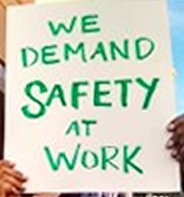 The province of Ontario is currently under Step Three reopening
guidelines. For the post-secondary sector, according to the government
website, Step Three requires "indoor capacity in each instructional space
limited to permit two metres physical distancing up to 50 per cent or
1,000 students, whichever is less,... physical distance of at least two
metres
between every other person must be maintained, except when necessary
for teaching or instruction." There are also restrictions on outdoor
capacity. The province of Ontario is currently under Step Three reopening
guidelines. For the post-secondary sector, according to the government
website, Step Three requires "indoor capacity in each instructional space
limited to permit two metres physical distancing up to 50 per cent or
1,000 students, whichever is less,... physical distance of at least two
metres
between every other person must be maintained, except when necessary
for teaching or instruction." There are also restrictions on outdoor
capacity.
Just days before the opening of post-secondary institutions, in
response to a request for an exemption from the Council of Ontario
Universities, the province removed the Step Three guidelines for in-class
instruction at universities and colleges. Workers and their unions are
demanding that their health and safety and that of the students be the
determining factor, not the stand of the Council, which they deem to be
self-serving.
Exemption from the Step Three restrictions means that classes have
resumed with virtually no restrictions and without measures for
enhanced cleaning or ventilation or the option of working remotely. 
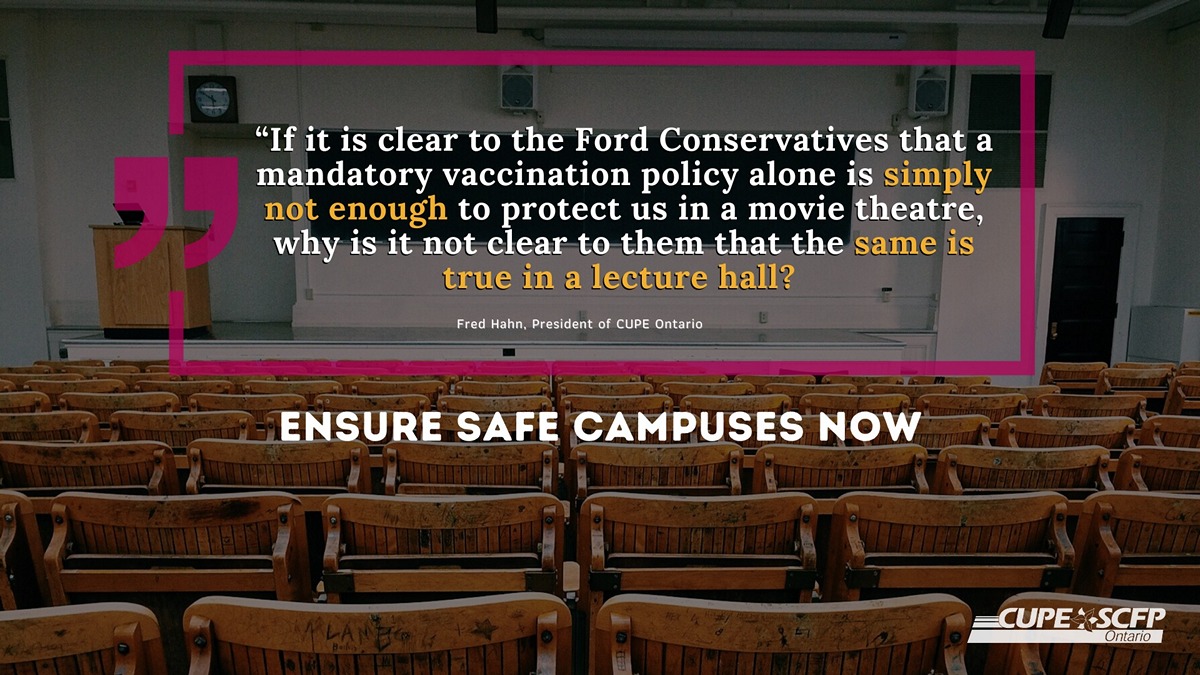
At a press conference held on September 23,
representatives of education workers organized in the Canadian Union of
Public Employees (CUPE) Ontario, addressed the demand for protections
from COVID-19 for workers and students at post-secondary institutions.
Kathleen Webster, Vice-Chair of CUPE Ontario's University Sector and
Chief Steward of CUPE 2361 representing support staff members at the
University of Western Ontario, said:
"For the entire pandemic, we have been asking the Ford Conservatives
to consult with students and university workers. They have not. They
have ignored us. Had they spoken to us we would have told them that,
given decades of underfunding, many of our universities have not had
the funds needed to invest in capital repairs, including the
kinds of improvements to ventilation that would be necessary to stop
the spread of COVID. We would have told them that years of underfunding
had led many of our Universities to cut staff, contract out cleaning
and maintenance services to the lowest bidder, and reduce cleaning
standards to the level of 'unkempt' neglect which is not good enough
in the best of times but is particularly problematic during a public
health crisis like COVID-19."
Sharoni Mitra, President of CUPE 3906, representing workers at McMaster University, said:
"I can't say it clearly enough: removing these important measures is
endangering students and workers at McMaster. Right now, McMaster is
allowing up to 100 students in classrooms with no distancing measures.
We're also seeing tutorials in small, crowded basement spaces. There's
no confirmation of cleaning schedules in shared office
space, and there's no commitment to allow workers to choose to work
remotely where possible."
Amy Conwell, Chair of CUPE 3902, representing academic workers at the University of Toronto (U of T), said:
"As expected, this September looks a lot like a regular,
pre-pandemic semester. Despite the ongoing pandemic, prevalence of the
Delta variant, and likelihood of transmission in closed, crowded
settings like classrooms and laboratories, U of T has few real
workplace controls in place, especially at the St. George campus.
Consequently, we
simply do not have confidence that U of T's COVID-19 mitigation
strategy will keep workers and students safe. But we also don't have
confidence in the Ford Conservatives."
Sherri Ferris, President of CUPE 229, representing custodial, trades, and food service workers at Queens University, said:
"As support staff on campus, we know the Ford Conservatives are not
doing enough to ensure a safe return to in-person learning. This
decision to lift in person capacity limits was sprung on us at the last
minute by the Ford Conservatives. Basically, the day before school
opened, the Ford Conservatives made this regulation and exempted
universities."
Fred Hahn, President CUPE Ontario, said:
"If it is clear to the Ford Conservatives that a mandatory
vaccination policy alone is simply not enough to protect us in a movie
theatre, why is it not clear to them that the same is true in a lecture
hall? They know better and it's so unconscionable that the province
would remove critical measures like capacity limits and physical
distancing
requirements for indoor instructional spaces, like classrooms and labs.
We need these measures in place immediately to keep students and the
30,000 CUPE Ontario support and academic workers on campuses safe." 
(To access articles individually click on the black headline.)
PDF
PREVIOUS
ISSUES | HOME
Website: www.cpcml.ca
Email: office@cpcml.ca
|

